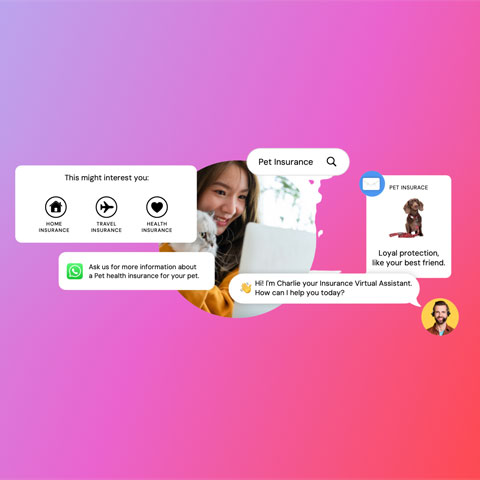How to Get Started with CRM

Customer relationship management (CRM) systems are increasingly being used by small and medium-sized business to help improve efficiency and business process. Properly implemented, a well managed CRM system will bring significant benefits. By managing your contact with new and existing customers, you can maximise ROI from marketing spend, improve customer service and much more. This guide discusses the key factors to consider when undertaking CRM projects within SME's.
Get the downloadBelow is an excerpt of "How to Get Started with CRM". To get your free download, and unlimited access to the whole of bizibl.com, simply log in or join free. |

|
What to do first
Right from the beginning of your CRM project, it’s important to identify the specific problems, in each area of your business, you are looking to address. For example, you may want your customer service department to solve issues more quickly, or for marketing to improve the way they track leads, or for your sales staff to increase the accuracy of their sales forecasting.
When you’ve decided what you want from your CRM system, talk to the people who will be using it. What day-to-day issues do they have that the system should address? Don’t be afraid to get into details and specifics at this stage. For example, deciding early on that case scheduling for your customer service staff, or easy report development and generation for your sales team are major priorities will help as the project progresses.
Once you’ve identified what you want the system to achieve, set some measurable objectives and Key Performance Indicators (KPIs), defining your success criteria. So, if one of your overall objectives is to reduce costs, translate this to hours saved and hence value (price per hour). Example KPIs could include:
- Number of hours saved through better task management
- Overall reduction in errors - resulting in hours saved rectifying mistakes
- Hours saved through faster business processes and greater efficiency
Similarly, you could measure sales and marketing KPI’s through:
- Higher numbers of leads generated
- Decrease in ‘lost’ leads
- Increased lead quality
- Higher sales conversions
Start with the right business partner
It’s highly unlikely that you will achieve the CRM functionality you require, from any CRM software solution, straight ‘out of the box’. You may have skilled IT staff, but most companies don’t have the right mix of skills, or willingness to allocate them, to implement CRM systems entirely on their own. For this you’ll need an accredited or certified CRM software reseller (often referred to as a business partner).
Accredited or certified software resellers will have been trained and approved by the software manufacturers to help customers specify, select, install, and configure their software. They will also be able to provide training and after sales support. Many will also be able to create or program CRM add-ons and bespoke CRM applications. Certification or accreditation is usually tiered, examples of the highest levels being ‘Premium Partners’ or ‘Gold Certified Partners’.
CRM is about more than technical and software skills however. To implement CRM systems effectively, a business partner will need a good mix of project management, knowledge of business processes and workflow analysis skills. They will also have experience of sales and marketing system design, customer service system development and managing the changes CRM projects bring about.
Ideally, choose a business partner that is a CRM specialist, or at least one that can provide references and case studies of successful CRM projects. If they are independent, they’ll be able to offer a range of CRM software from different suppliers, so they can recommend the package most suited to your business needs.
Independent CRM specialists are companies that have in-depth knowledge, skills and experience of customer relationship management (CRM). They will provide a wide range of CRM services, and will not be tied to or biased towards any one CRM software manufacturer. Independent CRM specialists will also have extensive theoretical knowledge of CRM as well as broad practical experience and skills developed from implementing CRM systems in a variety of different business areas.
Want more like this?
Want more like this?
Insight delivered to your inbox
Keep up to date with our free email. Hand picked whitepapers and posts from our blog, as well as exclusive videos and webinar invitations keep our Users one step ahead.
By clicking 'SIGN UP', you agree to our Terms of Use and Privacy Policy


By clicking 'SIGN UP', you agree to our Terms of Use and Privacy Policy
Whoever you choose as a business partner, make sure they don’t see CRM as an aside to their core business. Also check they offer a full range of services, and do not just supply software and installation.
Assess your business and software requirements
There are many different CRM software solutions available for small and medium-sized businesses, each with varying functions, technical specifications, hardware requirements and so on. These range from very low-cost and open source software (think very seriously before entrusting your key business functions and data to one of these!) to ‘best-of-breed’ CRM software specifically aimed at SMEs. These include products such as Microsoft Dynamics CRM, Sage CRM, Sage SalesLogix and the FrontRange GoldMine suite of CRM solutions.
If you’re working with an independent CRM provider, they will be able to perform an assessment of your business and recommend a CRM solution most suited to your requirements. The assessments usually consist of an analysis of your existing company infrastructure, and will look at the aims, objectives and KPIs of your CRM project.
If you choose to perform the business assessment yourself, key factors to take into account include:
- The level of CRM functionality required to meet your defined objectives
- The degree of CRM system configuration necessary
- If there is a need for CRM software customisation (as opposed to configuration)
- The number of users (leave room for future growth – CRM systems soon become popular)
- If any users will require remote access, and how (e.g PDAs, laptops or PCs)
- If integration with other systems, such as accounts, document management or email, is required
- Security levels
- Whether you will use your existing data, and the extent of cleansing
- Levels of staff training
- Existing hardware and network infrastructure
- Future functionality (is there a clear upgrade path?)
- And, of course, costs. Overall cost of ownership will include software licences, hardware, support, maintenance, and (if you choose a hosted solution) a tie in to monthly fees.
Decide between on-premise or hosted
There are two ways to deploy a CRM system: on-premise or hosted (often referred to as software-as-a-service). There are also options that offer a mixture of both. There’s an ongoing debate as to whether on-premise or hosted CRM software is best, and a quick internet search will bring up a wealth of arguments each way.
In summary, on-premise is the most popular deployment method, providing the benefits of ownership, control, customisation, flexibility and integration. However, hosted solutions can be convenient to set up, requiring less changes to hardware and software infrastructure. But then, in the long-term, hosted solutions can be more expensive and lack the benefits of having your own system.
So, hosted or on-premise CRM? Which deployment method to choose? It depends on your business.
If you are investing in CRM for the long-term, an onpremise solution can be precisely configured to the needs of your business and adapted as your business changes and grows. It may initially be more expensive to set up than a hosted solution (for example you may need to update your hardware or server system), but you will not be tied-in to the level of monthly or annual fees that many hosted solutions require. In this case, an on-premise solution will usually work out more cost-effective while bringing you more benefits.
If you want to try CRM out, using standard functions with limited customisation or control, and are unlikely to need integration, then in the short-term a hosted solution may be the answer. Hosted solutions can be a good way of trialling a CRM system before committing to an on-premise solution. Switching costs are unlikely to be as high as changing on-premise solutions. For example, SageCRM.com can be an ideal CRM starting point for some small and mid-sized companies. It’s often a quick and easy fit, and can go a long way in installing a ‘CRM culture’ within a growing business. It’s then straightforward to transfer the SageCRM.com database to an in-house CRM system (and migration to on-site Sage CRM is seamless). However, the costs of many other hosted solutions can be unpredictable: there can be reliability and security issues, and if you do decide to move to an on-premise solution later, you may be left wondering why you didn’t opt for a small-scale on-premise solution to start with.
Plan the implementation
Whatever the size of your project, work to a project methodology and appoint a project manager. If you’ve chosen a CRM specialist as a business partner, they will usually include project planning and management as part of the package.
Want more like this?
Want more like this?
Insight delivered to your inbox
Keep up to date with our free email. Hand picked whitepapers and posts from our blog, as well as exclusive videos and webinar invitations keep our Users one step ahead.
By clicking 'SIGN UP', you agree to our Terms of Use and Privacy Policy


By clicking 'SIGN UP', you agree to our Terms of Use and Privacy Policy
A good business partner will use a defined CRM project methodology1, certainly for larger projects. However, for a business with say five users and straightforward requirements, a typical CRM implementation plan will include:
- Business process and requirements analysis
- Software configuration
- Installation and commissioning
- Data preparation and import
- User training
- Report development
- System review
Although your business partner will perform the bulk of these tasks, remember you will need to provide resources and input on all the above points. In areas such as data cleansing, this input can be significant, as your own staff will know your data better than anyone else. Training, at both user level and administrator level will also require staff time and availability. It’s usually more efficient to train as many staff as possible at the same time. The duration for training will depend on the complexity of your system and your staff, but for the example of a straightforward five user system training will typically take one or two days.
Make sure your system is fully supported
A full support and maintenance structure should be in place early on in your project, and for at least two months after the system has gone live. This will typically include:
- User assistance and support, providing access to a support line for 'How do I...?' questions. This level of support will save a lot of frustration, time and effort.
- Administrator assistance and support. This will help your system administrator quickly and efficiency address issues with running the system.
- Supply of software corrections and revisions.
- Remote intervention. For more serious problems, it can save a great deal of time and effort if your business partner is able to access your system via the internet (for security access should be controlled by you).
- Online knowledge-base and support centre – for easy reference and to enable you to keep track of how issues are progressing.
Watch out for the pitfalls
When CRM systems are properly implemented, the results can be outstanding. However, according to research from Gartner, as many as 60% of all CRM implementations fail. So:
- Don’t see CRM as just software. Even for small implementations it is a strategic shift involving staff, processes and procedures.
- Don’t be ruled by software specifications – make sure you know what you want your system to do, and then look for the software to do it.
- Adopt and work to a project management methodology.
- Get buy-in from your staff – make sure they clearly see the advantages, have provided input, understand the system and are trained to use it properly.
- User adoption is essential. However, CRM systems which excel achieve user addiction.
- Choose the right business partner. Make sure they are experienced: check their references, technical accreditations and ask for case studies of previous work. Above all, they should demonstrate a clear understanding of your business requirements and be able to translate these to business benefits.
- Make sure your business partner provides a full range of services, has more than one CRM software option, and can demonstrate their ability to implement your CRM system quickly, with minimal disruption to your business.
- Review the system on a regular basis. As your business changes, so will your CRM system. Regularly review its functionality from both a process, user and technical perspective. And don’t forget to update your documentation, processes and procedures to reflect any changes.
- Communicate! Arguably, the most common cause of failure of CRM projects is poor communication. This includes internal communications, for example between IT, project managers and end users, as well as between business partners and client companies.
Want more like this?
Want more like this?
Insight delivered to your inbox
Keep up to date with our free email. Hand picked whitepapers and posts from our blog, as well as exclusive videos and webinar invitations keep our Users one step ahead.
By clicking 'SIGN UP', you agree to our Terms of Use and Privacy Policy


By clicking 'SIGN UP', you agree to our Terms of Use and Privacy Policy









